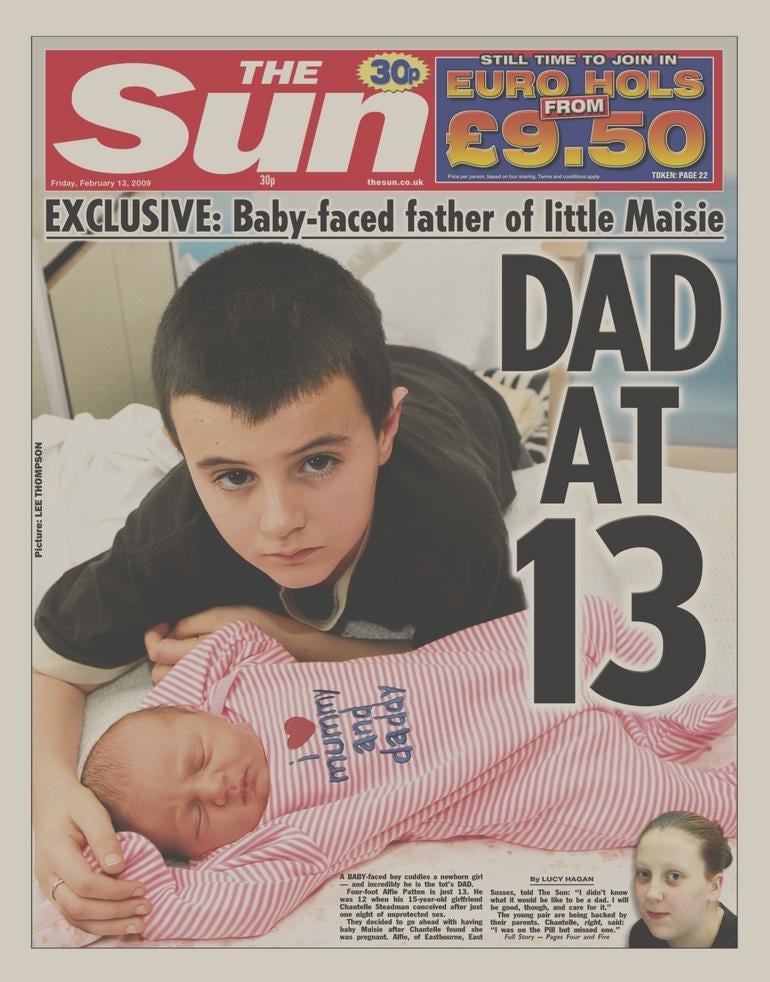
The Press Complaints Commission has issued new guidance to editors on the issue of paying parents for stories about their children.
The commission launched an investigation earlier this year into alleged tabloid newspaper payments to the parents of Alfie Patten, the 13-year-old boy alleged to have fathered a 15-year-old girl’s baby daughter.
Stories, including pictures of Alfie, Maisie, the baby, and Chantelle Stedman, the schoolgirl mother, appeared in The Sun and other newspapers in February.
Interviews with Alfie Patten and his family, questioning whether Alfie was indeed the father, appeared in the People and Sunday Mail.
DNA tests later showed that another teenager, 15-year-old Tyler Barker, was in fact Maisie’s father.
The PCC said today that it had tried to investigate whether payments to the family had been made – but restrictions imposed soon after that by an injunction made it impossible to make a comprehensive investigation.
The PCC that while it could not give a ruling on whether any editors had breached Clause 6 of the editors’ code of practice, covering children, it was making a public statement to raise awareness of the factors which editors would need to take into account when considering whether to pay parents for stories about their children.
It said editors should ask three questions:
- Was the payment alone responsible for tempting parents to discuss a matter about a child which it would be against the child’s interests to publicise? If so, only an “exceptional public interest” could justify such an arrangement.
- Was there any danger that the offer of a payment had tempted parents to exaggerate or even fabricate the information?
- Was the payment in the child’s interest?
The PCC said Clause 6 banned paying parents for material about their children’s welfare, unless it was clearly in the child’s interests or there was an exceptional public interest.
“The commission may require a newspaper to show that additional enquiries about the veracity of a story have been made, rather than that they have simply taken the parents’ word at face value,” it said.
Editors would have to show that they had taken great care when publishing such stories.
As the Code required payments to be in a child’s interest, editors had to be able to show how they took care to consider the child’s interests.
There were also likely to be times when the parents’ right to freedom of expression would conflict with what was best for the children – it might not be in the youngsters’ interests to have information about their private lives publicised.
“Editors will be expected at all times to put the child’s interests first. They will also have to take note of the nature of the relationship between parent and child, and whether the parent is in a position to represent positively the child’s interests,” the guidance said.
“On some occasions, this will mean – where there is an insufficient public interest in the story – that payment should not be made, even if the parents are happy for the story to be published.”
If a story concerned a child’s welfare but payment was not deemed likely to be in the child’s interests, editors could only justify payment if they could show an “exceptional public interest”, the PCC said.
It added: “It is not sufficient to rely only on the parents’ rights to freedom of expression. A satisfactory explanation must be given about how the public interest had been served to an exceptional extent to override the normally paramount interest of the child.”
The PCC said that in the Alfie Patten case, newspapers argued that the articles involved the important issue of the prevalence, and impact, of teenage pregnancy within British society, dramatising and personalising the issues in a way which stimulated a wide-ranging public debate.
The newspapers had argued that they were fulfilling an important duty in publicising to a large audience a social problem which was perceived to be widespread, and that the case was, on the evidence available at the time, an exceptional example of the problem.
“Such arguments would have had to be weighed against the counter arguments that this example of teenage pregnancy was not so extraordinary as to warrant the coverage or to justify the probable impact on the children,” the PCC said.
It said it was clear that the practice of paying parents for interviews about their children – which might involve, for example, their family’s experience of a particular illness or social situation – was not unusual, and that in the majority of cases this would not involve a breach of the code.
“But where there are doubts about the motives of the parents in seeking payment, or the possible impact on the child’s welfare, editors must pause and consider what effect payment and publication will have on the child,” it said.
Email pged@pressgazette.co.uk to point out mistakes, provide story tips or send in a letter for publication on our "Letters Page" blog
